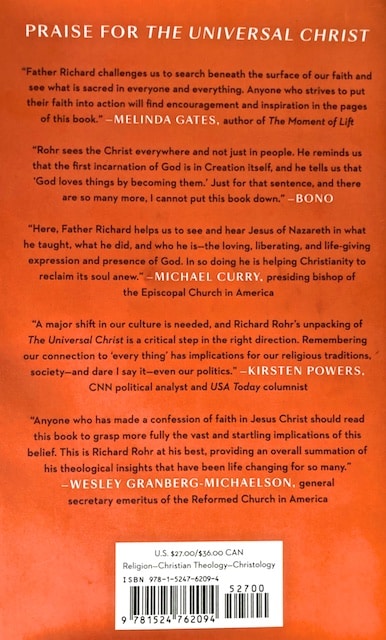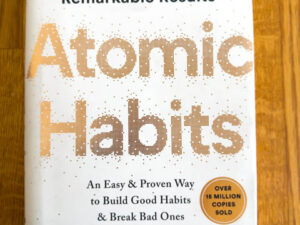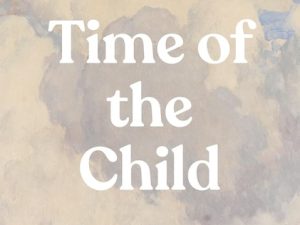
This book by Franciscan monk Richard Rohr is extremely progressive for a Catholic. I liked the other book of his I read better, as it was less theological, but I appreciated this one for its contemporary thought and application.
He went to bat for things I care about: stewardship of the environment, women as spiritual leaders, original innocence and goodness, and Jesus as the way-shower of the highest ideal, rather than a mistake fixer for God, or God himself. This book deserves applause for all that.
The first half was more engaging, and I really felt it bogged down the longer it went on, like he felt he needed to justify himself. If I hadn’t been reading it for a book group with my husband, I’m not sure I would have finished it, since it is rather dense and plodding. Because of this, I can only give the book four stars.
However there are some marvelous bits I wanted to remember and share with all of you. Here are what I felt were the highlights:
- “Christ is not Jesus’ last name.”
- “Universal truth… does not depend on… the anemic notion of individual salvation for a very few on one minor planet in a still-expanding universe, with the plot line revolving around a single sin committed between the Tigris and Euphrates rivers!”
- “What I am calling in this book an incarnational worldview is the profound recognition of the presence of the divine in literally ‘everything’ and ‘everyone.’ It is key to mental and physical health.”
- “We would have helped history and individuals so much more if we had spent our time revealing how Christ is everywhere instead of proving that Jesus was God.”
- “St. Bonaventure (1221-1274) taught that to work up to loving God, start by loving the very humblest and simplest things, and then move up from there… I encourage you to apply this insight quite literally. Don’t start by trying to love God, or even people; love rocks and elements first, move to trees, then animals, and then humans.”
- “After Augustine, most Christian theologies shifted from the positive vision of Genesis 1 to the darker version of Genesis 3– the so called fall, or what I am calling the ‘problem.’ Instead of embracing God’s master plan for humanity and creation…Christians shrunk our image of both Jesus and the Christ, and our ‘Savior’ became a mere Johnny-come-lately ‘answer’ to the problem of sin, a problem we had largely created ourselves. That’s a very limited role for Jesus. His death instead of his life was defined as saving us.”
- “Historically, the teaching of original sin started us off on the wrong foot- with a no instead of a yes, with a mistrust instead of a trust… If you start with a problem, you tend to never get beyond that mindset… To begin climbing out of the hole of original sin, we must start with a positive and generous cosmic vision. Generosity tends to feed on itself. I have never met a truly compassionate or loving human being who did not have a foundational and even deep trust in the inherent goodness of human nature.”
- “The only way, then, to increase authentic spirituality is to deliberately practice actually enjoying a positive response and a grateful heart. The benefits are very real… We must–yes, must– make a daily and even hourly choice to focus on the good, the true, and the beautiful.”
- “Jesus did not say, ‘This is my spirit given for you,’ or even, ‘These are my thoughts.’ Instead, he daringly said, ‘This is my body,’ which seems like an overly physical and risky way for a spiritual teacher to speak. I have come to realize that, in offering his body, Jesus is precisely giving us his full bodily humanity more than his spiritualized divinity! ‘Eat me,’ he shockingly says, eating being such a fundamental bodily action, more basic and primitive than thinking or talking. The very fleshly humanity that Paul later presents negatively in his usage, Jesus presents positively.”
- “Salvation became a one-time transactional affair between Jesus and his Father, instead of an ongoing transformational lesson for the human soul and for all of history.”
- “It’s time for Christianity to rediscover the deeper biblical theme of restorative justice which focuses on rehabilitation and reconciliation and not punishment… Love cannot be bought by some ‘necessary sacrifice’; if it could, it would not and could not work its transformative effects…. Far too many evils have been committed in history under the manipulative cry of ‘sacrifice.'”
- The Divine Mind transforms all human suffering by identifying completely with the human predicament and standing in full solidarity with it from beginning to end. This is the meaning of the crucifixion. The cross is not a single event. It’s a statement from God that reality has a cruciform pattern… We are indeed saved by the cross – more than we realize. The people who hold the contradictions and resolve them in themselves are the saviors of the world. They are the only real agents of transformation, reconciliation, and newness.”
- “Christianity is now more of a contest, or even an ego trip, than a proclamation of divine victory and love.”
- “I suspect that Western individualism has done more than any other single factor to anesthetize and even euthanize the power of the gospel.”
- “It is no longer about being correct. It is about being connected. Being in right relationship is much, much better than just trying to be ‘right.'”
- Patriarchal Christianity and the idea that the priesthood should be reserved for men, “is undone by Christ appearing first to Mary after the resurrection, and by his charge for her to be his first witness.”
- “I am convinced that in many ways Buddhism and Christianity shadow each other. They reveal each other’s blind spots. In general, Western Christians have not done contemplation very well, and Buddhism has not done action very well.”
- “‘God comes to you disguised as your life,’ as my friend Paula D’Arcy says so well. Who would have thought? I was told it was about going to church.”
- “Foundationally, we must find a prayer that actually invades our unconscious, or nothing changes at any depth.”
So given all that clear sightedness, you may want to read The Universal Christ. In my view, it represents a true jump forward for the Catholic church.

5 Comments
-
Based just on these excerpts, it looks like a 5 to me!
-
Thank you for such a thorough and inspiring review! This is a book I would like to read! Hugs precious Polly!!
-
Are currently on Chapter 13 of Universal Christ. Do you have an analysis of each chapter or know of one?
-
Author
Nope.
-
Pingbacks
-
[…] 1. The Universal Christ […]






